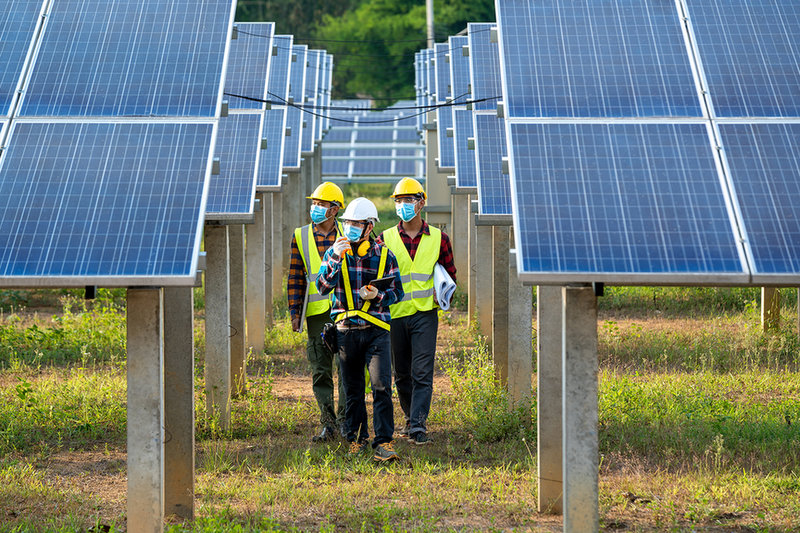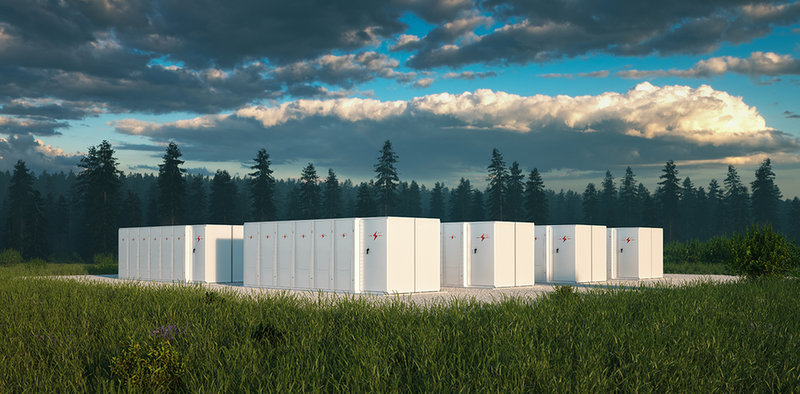
Analysis
Power predictions: key themes for 2021
From world events to disruptive technologies, GlobalData explores some of the key themes that will impact the power sector in 2021.
G
lobalData has identified 20 top themes that will impact the power sector in 2021, including energy sector-specific issues, emerging disruptive technologies, global events and business and economic drivers. Here we look some of the key themes identified in GlobalData’s thematic research report to find out how they will impact the power sector in 2021.
Covid-19

The renewable energy share of power generation is set to increase in future due to Covid-19.
Globally, renewable energy has remained resilient during the pandemic and this is likely to continue in the future. We foresee continued growth in renewables throughout 2021 due to electricity demand coming back to normal, low operating costs, and priority or guaranteed access of renewable power generators to the grid through regulations.
In addition to these trends, the renewable energy industry will witness a major shift toward local manufacturing, reducing supply chain dependence on imports and encouraging the setup of new domestic manufacturing facilities.
The pandemic has underscored the need for clean air and health more generally. Emissions reductions due to Covid-19 have led environmentalists to advocate for more renewable energy to maintain these levels and help to steer the world away from climate crisis. This will further help to boost renewable energy.
The duration and severity of Covid-19 impacts on capital markets and economies will stymie the flow of investments.
The economy-driven demand reductions will hurt new installations. New projects will be delayed due to lack of capital and equipment. Power and utility companies will partially halt building new plants and tighten their budgets. Investments in renewables are expected to fall by 9-10%.
Moreover, the resurgence of coronavirus cases can lead to renewed lockdowns and can put a strain on workforce, such as limited availability of engineers and limitation on movement of workforce which would further create operational challenges.
With financial issues increasing for companies in the power sector, it is expected to take a major toll on investment in 2021. A complete recovery will depend on the effective containment of the virus and availability of vaccines to the general public.
Wholesale electricity prices will decline.
Power companies took a financial hit in 2020 as both demand and wholesale electricity price fell due to Covid-19’s economic impact. As demand rebounds, electricity prices are expected to do the same.
Technology diversification

Supply diversification will protect utilities from political and economic downturns.
The pandemic crisis will act as a catalyst to encourage energy transition. Technological diversification into renewables will gain momentum in 2021, as diversified power production portfolios help to limit volatility.
In many EU countries, utilities with broader technological footprint were better able to withstand economic and regulatory bumps. Diversification not only helps to minimise risk of variation in yearly output; it also reduces daily and hourly deviation from forecasts, hence supporting balancing services and helping avoid unbalancing penalties.
India and the European Union are expected to witness a large upswing in renewable energy in 2021 as a result of the commissioning of projects delayed by the pandemic.
The cost of renewable energy is decreasing.
Sharp declines in cost are helping to make renewable energy the lowest-cost source of new power.
Contributing trends include growing preference for low-carbon sources, decentralisation, supply diversification, slower growth in energy demand, structural economic change in China, tighter air pollution standards and regulations and climate policies.
The cost decline is to be observed throughout 2021 resulting in companies switching to alternate source of energy.
Government stimulus to rebound the economy will help energy transition.
Considering the economic recession and policy priorities, governments are likely to provide stimulus to rebound the economy. This will help to accelerate the energy transition as stimulus funds will be oriented to environment in light of requirements under the Paris Accord of 2015 as well as economic recovery.
In Mid-2020, the EU proposed a major recovery plan to ensure the economic recovery is sustainable, even, inclusive and fair for all member states. The commission committed to €1.8tn of funding, including a recovery package of €750bn to be allocated among EU member states and consisting of €360bn in loans and €390bn in non-repayable grants. Some 30%, equivalent to €225bn, is dedicated to energy transition in the next seven years.
Other countries are expected to make similar pledges, which will further promote utilities’ technology diversification in 2021.
Political and macroeconomic factors will promote diversification in 2021.
China and the US, the world’s two largest carbon emitters, are expected to increase renewable capacity in 2021. Further, the US re-joining the Paris Accord will lead to policies favourable for the shift to renewables.
Sustainability

More companies are committing to net-zero targets.
In line with the Paris Accord, many companies are expected to pledge for net-zero emission by 2021.
Realising the role of small and medium enterprises (SMEs) in the transition to a zero-carbon economy, many new platforms have been introduced aiming to support SMEs in reaching net zero, such as the SME Climate Hub.
A number of companies are expected to pursue net-zero targets by the end 2021, as many prioritise climate action in their recovery from Covid-19.
Strict emission regulations will promote sustainability in 2021.
Governments will be introducing new norms and regulation to promote sustainability as several countries have performed insufficiently and haven’t yet taken significant steps toward achieving the Intended Nationally Determined Contributions (INDCs) set by themselves. These countries will see an increased pressure from UNFCCC and other global think tanks to take up measures toward fulfilling their INDCs.
In the EU, new sustainability related disclosures will take effect from 10 March 2021; this will help to enhance transparency regarding integration of environmental, social and governance matters (ESG) into investment decisions and recommendations. This will help to limit funding on non-sustainable projects across the region, thereby promoting renewable solutions.
Covid-19 will drive sustainability changes.
Consumers’ concern for the environment has grown in line with increased awareness of health. The pandemic is driving the urgent need for evaluation of issues in the power sector which have potentially been underplayed, including environmental, social and governance policies.
As consumers are looking towards brands for environmental leadership, many companies have pledged to drive sustainability changes. In the power sector, this is most notable in commitments to transitioning to to cleaner resources and energy efficiency.
Climate change will become a greater priority for communities post-Covid, therefore utility providers will have to understand the business climate in which they operate and consider demographic, economic, political, as well as consumer sentiments related to energy transition.
The era of coal-fired power generation is drawing to a close with the retirement of coal power plants.
Many countries, including the world’s largest users of coal, China and India, have recently announced their intentions to close their coal power plants.
In 2021, the rate of decommissioning of coal power plants – either through shutdown or through conversion into biomass or natural gas-fired plants – will intensify as countries try to cut their carbon footprint.
India is targeting 175 GW of renewable power capacity installed by 2022. However, to achieve this, the country would require massive investments and strong legal policies.
Despite a temporary increase in coal generation by 2021 to match demand; coal-fired generation will witness a long-term downward trend in the EU, China and the US by the end of 2021.
Mergers and acquisitions

Covid-19 negatively impacted the power M&A market in 2020 but activity may increase in 2021.
The trend of consolidation in the renewable energy segment continued until 2019 and was expected to continue into 2020, but the Covid-19 pandemic put the brakes on M&A activity on the power sector, including renewables, in 2020.
However, themes such as a renewable energy and sustainability were the key themes driving M&A activity in recent years and this trend is expected to continue in 2021 and beyond.
The changing geopolitical situation in the oil and gas supply markets in the Middle East is also expected to lead the demand for renewable energy across the globe. Over the past decade, the growth of renewable power has gained momentum in many countries. With the industry maturing and costs falling significantly to make renewable power economically viable with little or no subsidies, we expect renewable energy adoption to continue its upward trend.
In 2021, more countries are expected to enter the league of large-scale renewable power installations and drive deal activity for the year 2021 and beyond.
Energy storage industry will see a rebound in M&A activity in 2021 and beyond.
Energy storage installations linked with the electricity grid and related services are expected to surge in the coming years due to major drivers such as increased renewable energy integration, growing energy demand, asset retirements and smart digital technology innovation. As the energy storage industry continues to develop, it is crucial for companies to actively engage in technology advancement in order to stay ahead in the industry.
The energy storage sector registered a number of major mergers and acquisitions and partnerships in recent years, but the Covid-19 pandemic has stalled M&A activity and caused delay in a number of energy storage projects globally. M&A activity is expected to rebound in 2021 as the sector works to increase the scale of production.